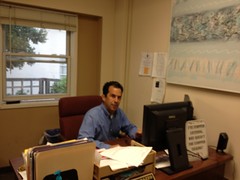Union Reps Voice Long Term Consequences of Shutdown

"I want to go back to work and I'm not allowed. I think that's crazy," says Karen.
She is one of thousands of government employees who is still on an unpaid leave from work. While the House of Representatives unanimously voted to provide back pay to all those who have been furloughed, it remains unclear whether this bill will be passed in the Senate. Regardless, as Congress deliberates on yet another aspect of the shutdown, federal employees deemed "non essential" are going without paychecks.
"My husband doesn't work for the most part, so I'm the primary wage earner in our home," says Karen. "It's definitely testing us."
While a select few companies like Hyundai are offering deferred payment options to those affected by the furloughs, the majority of lenders are expecting to receive their money as scheduled. For those living paycheck-to-paycheck, back pay won't resolve their immediate need.
Worse, back pay poses another concern. For a country still recovering from a recession and above average unemployment rates, some are outraged that federal employees will receive pay for time spent not working. Message boards and tweets from those angered by back pay often refer to furloughs as "vacations."
Karen says, "It's truly frustrating to me because, first of all, it's not a vacation. I'm not going anywhere, I'm not spending any money, because I don't know how long this is going to last. And, if I do get paid back, I still have bills to pay now. My mortgage company, they're not going to be like 'just pay me back when you get the money.'"

Pete, who is currently an IT specialist for the Naval Postgraduate School, is still trying to make sense of his finances after returning to work on October 7th. He says, "I'm a person who can tell you what I have in the bank, what I have in my wallet, what I have in each account, and as a result of this situation, I don't understand what's going on—and I'm someone who understands numbers."
Pete took a close look at his pay over the past couple of weeks and is still unsure whether his contributions and allotments were made properly. He's also uncertain whether federal income tax was taken out over this period, and when he'll have to pay that tax if it wasn't in fact deducted from his pay. Worse he worries about the ramifications of these furloughs.
"We are seeing a higher attrition rate now of people leaving as a result of some of this," admits Pete.
Karen, a union representative and FAA technical lead for the Unmanned Aircraft Research Program, is concerned that these furloughs will weaken the appeal of government jobs.
"I'm all but certain we'll probably lose some people over this and that it's a negative impact on our ability to attract people to the government," said Karen. "And we need new, strong, excited, smart talent to do what we do."
Another long term ramification of the furlough affects revenue collected from tax payers. Many projects, like those in the FAA, have deadlines set by Congress. If these deadlines are not met, the project might stand to lose all funding, creating a monumental loss of tax payer revenue.
This ripple effect extends far beyond government employees; several people on furlough have cut spending as a precaution. Karen, herself, sent home the contractors whom she had hired to renovate her kitchen mid-construction. Several others have cut down expenses by dismissing gardeners and other service providers.

Still others, like Karen, blame both parties equally. She says, "It almost feels like the government is going through a nasty divorce. In this case, the children are the American public and we are suffering from this." She explains, "It's their job to be able to, as our elected leaders, figure out the problems of this country, without causing additional problems in the future."
While some have been sent back to work, others are still waiting for Congress to come to an agreement. As for Karen, she's been spending her time giving back to the community. She continues to tutors local kids with their math homework and is working with her union to get people back to work.
As she mentions her 23 years spent as a federal employee, Karen says, "I really believe in the oath that I took to be a public civil servant. I chose this job because I'm proud of the work that I do and I'm honored to be a government employee." She hopes that Congress will consider the many people like her and reach a speedy decision.
Reach Stafff Reporter Tahsin Hyder here; follow her on Twitter here.



